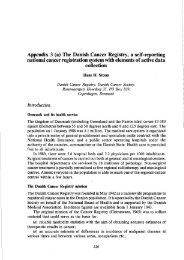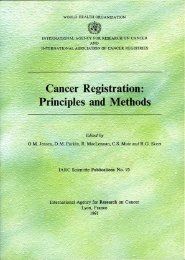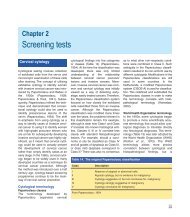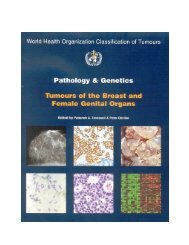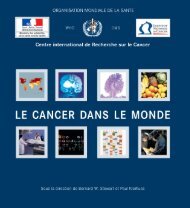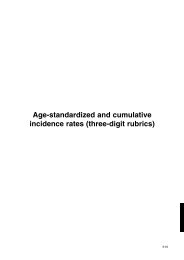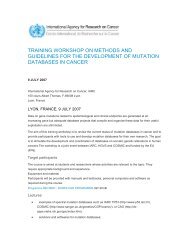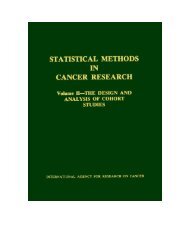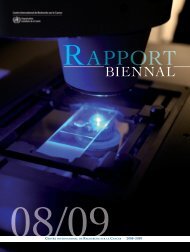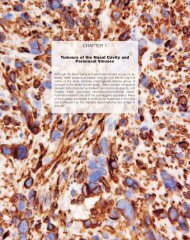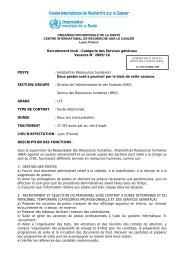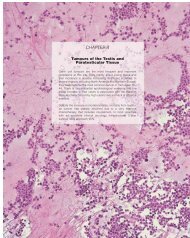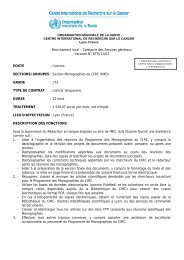world cancer report - iarc
world cancer report - iarc
world cancer report - iarc
You also want an ePaper? Increase the reach of your titles
YUMPU automatically turns print PDFs into web optimized ePapers that Google loves.
WHO TOBACCO FREE INITIATIVE<br />
The Tobacco Free Initiative is a WHO cabinet<br />
project created to focus international<br />
attention, resources and action on the<br />
global tobacco pandemic that kills more<br />
than four million people every year. It is<br />
estimated that tobacco will kill 10 million<br />
people a year by 2030 and that over 70%<br />
of these deaths will occur in the developing<br />
<strong>world</strong>.<br />
Globalization of marketing and trade in<br />
tobacco products means that all countries<br />
need to take strong action individually<br />
and together if their populations are<br />
to become free of the burden of tobaccorelated<br />
disease and death. WHO has initiated<br />
work on the Framework Convention<br />
on Tobacco Control - the <strong>world</strong>'s first set<br />
of multilaterally negotiated rules focusing<br />
on global tobacco control. Currently<br />
being negotiated by 191 countries, the<br />
treaty will be ready for ratification no<br />
later than 2003. This new legal instrument<br />
will address issues as diverse as<br />
tobacco advertising and promotion, agricultural<br />
diversification, tobacco product<br />
regulation, smuggling, excise tax levels,<br />
treatment of tobacco dependence, second-hand<br />
smoke and tobacco free areas.<br />
The challenge comes in seeking global<br />
and national solutions in tandem for a<br />
problem that cuts across national boundaries,<br />
cultures, societies and socioeconomic<br />
strata. The Framework Convention<br />
on Tobacco Control process seeks to activate<br />
all those areas of governance that<br />
have a direct impact on public health.<br />
Palliative care<br />
Since palliative care services can be provided<br />
relatively simply and inexpensively,<br />
they should be available in every country.<br />
Palliative care should be given high priority,<br />
especially in countries where the majority<br />
of patients are diagnosed with <strong>cancer</strong> at<br />
an advanced stage and cure for most of<br />
them is likely to remain impossible for<br />
308 Cancer control<br />
Science and economics will mesh with legislation<br />
and litigation. Health ministers will<br />
work with their counterparts in finance,<br />
trade, labour, agriculture and social affairs<br />
ministries to give public health the place it<br />
deserves.<br />
The Framework Convention on Tobacco<br />
Control process also involves building up<br />
the national capacities of countries to<br />
undertake tobacco control activities. This<br />
includes technical assistance on legislation<br />
but extends to many other areas. In collaboration<br />
with the World Bank, the Tobacco<br />
Free Initiative has been looking into the<br />
issue of the economics of tobacco control.<br />
The work demonstrates that the economic<br />
fears that have deterred policymakers from<br />
taking action are largely unfounded.<br />
Policies that reduce the demand for tobacco,<br />
such as a decision to increase tobacco<br />
taxes, would not cause long-term job losses<br />
in the vast majority of countries. Nor would<br />
higher tobacco taxes reduce tax revenues;<br />
rather, revenues would climb in the medium<br />
term. Such policies could, in sum, bring<br />
unprecedented health benefits without<br />
harming economies.<br />
Some of the projects that the Tobacco Free<br />
Initiative is involved in extend to surveillance.<br />
In collaboration with the USA<br />
Centers for Disease Control and Prevention,<br />
the Global Youth Tobacco Survey has been<br />
implemented in over 50 countries. The<br />
Global Health Professionals Tobacco Survey<br />
monitors tobacco use, assesses behaviours<br />
in providing cessation support to<br />
patients and assesses knowledge of health<br />
effects of tobacco. Advocacy for policy<br />
change is the cornerstone of the Tobacco<br />
years to come. Health care providers<br />
should be trained to deliver palliative care,<br />
both within health care facilities and in<br />
patients’ homes. Guidelines for the relief<br />
of <strong>cancer</strong> pain have been drawn up by and<br />
are available from WHO; the widespread<br />
availability of morphine for oral administration<br />
is critical to pain relief, and should be<br />
ensured by appropriate legislation [6,9].<br />
Fig. 7.5 Poster for Tobacco Free Sports, World No<br />
Tobacco Day 2002.<br />
Free Initiative’s communications and<br />
information work. “Tobacco Kills - Don't<br />
be Duped”, a two-year United Nations<br />
Foundation-sponsored project on media<br />
and nongovernmental organization advocacy<br />
for policy change, was launched in<br />
1999 and is being piloted in over 25 countries.<br />
World No Tobacco Day, May 31 st,<br />
focuses on different themes every year.<br />
The theme for 2002 was Tobacco Free<br />
Sports. The United States Centers for<br />
Disease Control and Prevention, the<br />
International Olympic Committee, the<br />
Federation Internationale de Football<br />
Association (FIFA), Olympic Aid and other<br />
regional and local sports organizations<br />
joined WHO in this campaign. Tobacco<br />
free events organized all over the <strong>world</strong><br />
included the 2002 Salt Lake City Winter<br />
Olympic Games in the USA and the 2002<br />
FIFA World Cup in the Republic of Korea<br />
and Japan.<br />
These and other areas of work all have a<br />
single purpose - to cut back on tobacco<br />
consumption and to save lives.<br />
Managing the development of a<br />
National Cancer Control Programme<br />
Although countries differ in their preparedness<br />
to initiate national <strong>cancer</strong> control<br />
programmes, all, even the most technologically<br />
advanced, have to set priorities<br />
and decide how best to allocate the<br />
available resources. This requires several<br />
carefully-managed steps, which include:



